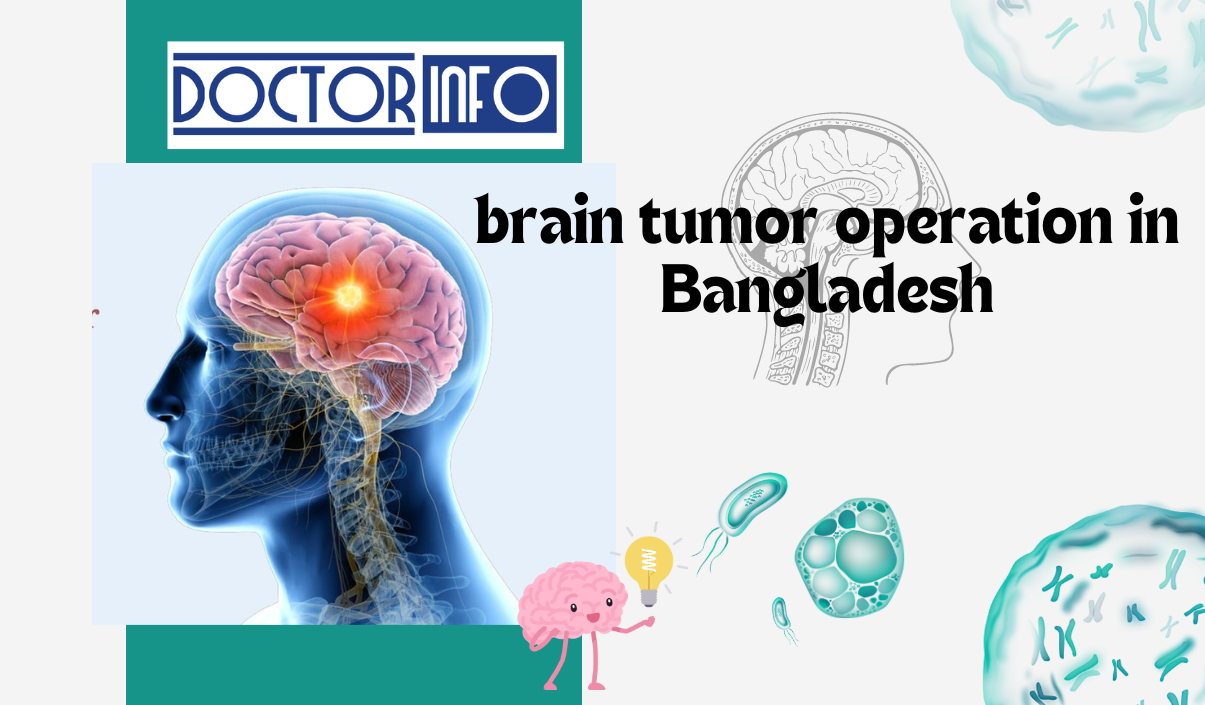Expert Brain Tumor Surgery in Bangladesh: Comprehensive Care and Advanced Treatment Options
- 09 Dec 2023
- Best Doctor List
Brain tumor operations in Bangladesh have seen significant advancements in recent years, offering hope and improved outcomes to patients facing this challenging diagnosis. As the medical field continues to evolve, Bangladesh has made notable strides in both diagnostic techniques and surgical interventions related to brain tumors.
Prof. Dr. Md. Shafiul Alam
MBBS, FCPS (Surgery), MS (Neurosurgery) FICS, FACS (USA), MRCS (Glasgow) Brain, Nerve and Spine Specialist
For serials and information call - 01902991500 (10:00 AM to 10:00 PM, excluding Fridays)
1. Advanced Medical Facilities: Bangladesh boasts modern hospitals and medical facilities equipped with state-of-the-art technology for brain tumor diagnosis and treatment. These facilities provide a range of diagnostic services, including MRI, CT scans, and PET scans, allowing for accurate tumor localization and assessment.
2. Experienced Medical Professionals: Highly trained neurosurgeons, oncologists, and multidisciplinary medical teams are at the forefront of brain tumor treatment in Bangladesh. They have extensive experience in both open and minimally invasive surgical procedures, ensuring comprehensive care for patients.
3. Minimally Invasive Surgery: Minimally invasive techniques, such as endoscopic and stereotactic surgery, are increasingly utilized for brain tumor removal. These procedures offer reduced recovery times and fewer complications for patients.
4. Collaborative Care: Brain tumor treatment often requires a multidisciplinary approach. In Bangladesh, patients benefit from collaborative care that involves neurosurgeons, oncologists, radiation therapists, and rehabilitation specialists working together to develop personalized treatment plans.
5. Affordability: Medical care in Bangladesh is relatively affordable compared to many other countries, making it accessible to a broader range of patients. This affordability extends to brain tumor diagnosis, surgery, and post-operative care.
6. Research and Innovation: The medical community in Bangladesh is actively engaged in brain tumor research and clinical trials, contributing to the development of innovative treatments and improved patient outcomes.
While challenges persist, such as access to advanced treatments and healthcare infrastructure in rural areas, the progress in brain tumor operations in Bangladesh reflects a commitment to providing quality care to those in need. As the nation continues to invest in its healthcare system, the outlook for brain tumor patients in Bangladesh is increasingly optimistic, with a focus on early diagnosis, advanced surgical techniques, and comprehensive patient care.
Brain Tumor Cost in Bangladesh
The cost of treating a brain tumor in Bangladesh can vary a lot based on a number of factors, such as the type and stage of the tumor, the chosen treatment methods, the location and reputation of the hospital or clinic, and whether or not the patient has health insurance.
Generally, diagnostic tests like MRIs and CT scans can cost anywhere from BDT 3,000 to BDT 15,000 or more. Brain tumor removal surgery can be more expensive, costing anywhere from BDT 50,000 to BDT 500,000 or more, based on how complicated the surgery is and where it is done.
Chemotherapy and radiation treatment can cost anywhere from BDT 2,000 to BDT 20,000 per session, and the number of sessions needed can be very different.
Patients with brain tumors should talk to their doctors and, if they have insurance, their insurance companies to find out the full range of possible costs and financial aid or insurance coverage. This will make sure that they can get the treatment they need without having to pay a lot of money.
Why Brain Tumor in Bangladesh?
Brain tumors can occur in Bangladesh, as in any other part of the world, due to various factors. Some reasons include:
Genetics and Risk Factors: Genetic predisposition can increase the likelihood of brain tumors. Certain inherited conditions may elevate the risk.
Environmental Factors: Exposure to environmental toxins or radiation, although relatively uncommon, can contribute to the development of brain tumors.
Infections: Certain infections like cytomegalovirus (CMV) and Epstein-Barr virus (EBV) have been associated with brain tumor development.
Age and Gender: Brain tumors can affect people of all ages and genders, although some types are more common in specific age groups or genders.
Lack of Awareness: Limited public awareness about brain tumor symptoms and risk factors can lead to delayed diagnosis and treatment.
Advancements in Diagnosis: Improved diagnostic capabilities, such as MRI and CT scans, have made it easier to identify brain tumors, leading to increased diagnoses.
It's crucial for individuals to be aware of potential risk factors, maintain regular health check-ups, and seek medical attention if they experience symptoms such as persistent headaches, seizures, changes in vision, or neurological issues. Early detection and treatment can improve outcomes in cases of brain tumors in Bangladesh or anywhere else in the world.
Brain Tumor Health Insurance in Bangladesh
Health insurance in Bangladesh can be a valuable resource for individuals diagnosed with brain tumors. While coverage varies among insurance providers, here's some general information:
Coverage Inclusions: Many health insurance plans cover the medical expenses related to brain tumor diagnosis, surgery, hospitalization, and follow-up treatments like chemotherapy and radiation therapy.
Pre-Existing Conditions: It's important to note that some insurance plans may have waiting periods for pre-existing conditions, which could affect coverage for individuals already diagnosed with a brain tumor at the time of purchasing insurance.
Premiums: Premiums for health insurance in Bangladesh depend on factors like age, medical history, coverage limits, and the insurance company. Individuals with pre-existing conditions might face higher premiums.
Network Hospitals: Insurance providers often have a network of affiliated hospitals and clinics. To maximize coverage, it's advisable to seek treatment at these network facilities whenever possible.
Claim Process: When making a claim for brain tumor treatment, thorough documentation of medical expenses, reports, and bills is crucial. Insurance companies typically have a claims process that policyholders must follow.
Consultation: It's advisable to consult with insurance experts or insurance providers directly to understand the specific coverage options, limitations, and terms related to brain tumor treatment in Bangladesh.
Having health insurance can provide financial relief and access to better healthcare facilities when facing the challenges of a brain tumor diagnosis and treatment in Bangladesh.
- Surgery for brain tumors
Surgery is a fundamental component of the treatment strategy for many brain tumors. Here is some information about surgery for brain tumors:
Surgical Goals: The primary objectives of brain tumor surgery are to remove as much of the tumor as possible while preserving essential brain function and relieving symptoms. In some cases, surgery aims for a complete resection, while in others, it may be partial, debulking, or biopsy.
Types of Brain Tumor Surgery
Craniotomy: This is the most common surgical approach, involving the removal of a portion of the skull to access the tumor. Once the tumor is removed or biopsied, the skull is typically replaced.
Stereotactic Surgery: This minimally invasive technique uses 3D coordinates to precisely target and remove the tumor, often guided by MRI or CT scans.
Endoscopic Surgery: Tiny cameras and instruments are inserted through small incisions or natural openings (like the nose) to access and remove tumors.
Laser Surgery: High-intensity laser beams can be used to destroy tumor tissue with minimal impact on surrounding healthy brain tissue.
Risks and Complications: Brain surgery carries inherent risks, including infection, bleeding, damage to surrounding brain tissue, and neurological deficits. The extent of these risks depends on factors like tumor location, size, and the patient's overall health.
Recovery: Recovery after brain tumor surgery varies based on the type and complexity of the procedure. Patients may experience temporary or permanent neurological deficits, and rehabilitation may be necessary for some.
Adjuvant Treatments: Surgery is often combined with other treatments like radiation therapy and chemotherapy to target any remaining tumor cells and prevent recurrence.
Multidisciplinary Approach: Brain tumor surgery is typically part of a comprehensive treatment plan that involves neurosurgeons, oncologists, radiation therapists, and other specialists working together to provide the best possible outcome for the patient.
Preoperative Evaluation: Patients undergo thorough preoperative assessments, including imaging studies, to determine the tumor's location, size, and relationship with critical brain structures. This information guides the surgical approach.
Brain tumor surgery is a critical step in the management of brain tumors, and advances in surgical techniques and technology have greatly improved outcomes and reduced the impact on patients' quality of life. It is often tailored to the specific characteristics of the tumor and the patient's overall health, with the goal of achieving the best possible prognosis.
- Side effects of brain surgery
Brain surgery, while often necessary for various medical conditions, can entail certain side effects and risks. These side effects can vary depending on the type and location of the surgery, as well as individual factors. Here are some common side effects of brain surgery:
Pain and Discomfort: Following brain surgery, patients may experience pain or discomfort at the incision site. Pain management is an essential part of postoperative care.
Swelling and Bruising: Swelling and bruising around the surgical site are common and usually subside over time.
Infection: Any surgery carries a risk of infection. Symptoms may include fever, redness, swelling, or drainage from the incision site.
Neurological Deficits: Depending on the location and extent of the surgery, patients may experience temporary or permanent neurological deficits. These can include weakness, numbness, speech difficulties, or changes in sensation.
Cognitive Changes: Brain surgery, especially in areas related to cognition, can lead to changes in memory, concentration, and other cognitive functions. These changes can be temporary or permanent.
Seizures: Brain surgery can increase the risk of seizures, either in the immediate postoperative period or in the long term. Medications are often prescribed to prevent seizures.
Headaches: Some patients may experience headaches after brain surgery, which can be managed with medications.
Scarring: Surgical incisions leave scars, which can vary in size and visibility. Scar care and cosmetic concerns may be relevant for some patients.
Emotional and Psychological Impact: Dealing with brain surgery can be emotionally challenging. Patients may experience anxiety, depression, or other emotional difficulties.
Changes in Sensation and Perception: Depending on the location of the surgery, patients may experience changes in their senses, such as vision, taste, or smell.
It's important to note that not all patients will experience these side effects, and their severity can vary widely. The specific risks and potential side effects should be discussed thoroughly with the healthcare team before surgery. Postoperative care and rehabilitation, including physical and occupational therapy, may be necessary to manage and mitigate some of these side effects and help patients achieve the best possible recovery.
Prof. Dr. Md. Shafiul Alam
MBBS, FCPS (Surgery), MS (Neurosurgery) FICS, FACS (USA), MRCS (Glasgow) Brain, Nerve and Spine Specialist Professor (Neurosurgery) National Institute of Neurosciences and Hospital, Dhaka.
Chamber Address: Plot No-10, Road-4/5,(kalshi road) Block-B, Section-12, Mirpur, Dhaka-1216, Bangladesh.
Visiting hours: Saturday to Thursday (7 pm to 9 pm).
For serials and information call - 01902991500 (10:00 AM to 10:00 PM, excluding Fridays)






